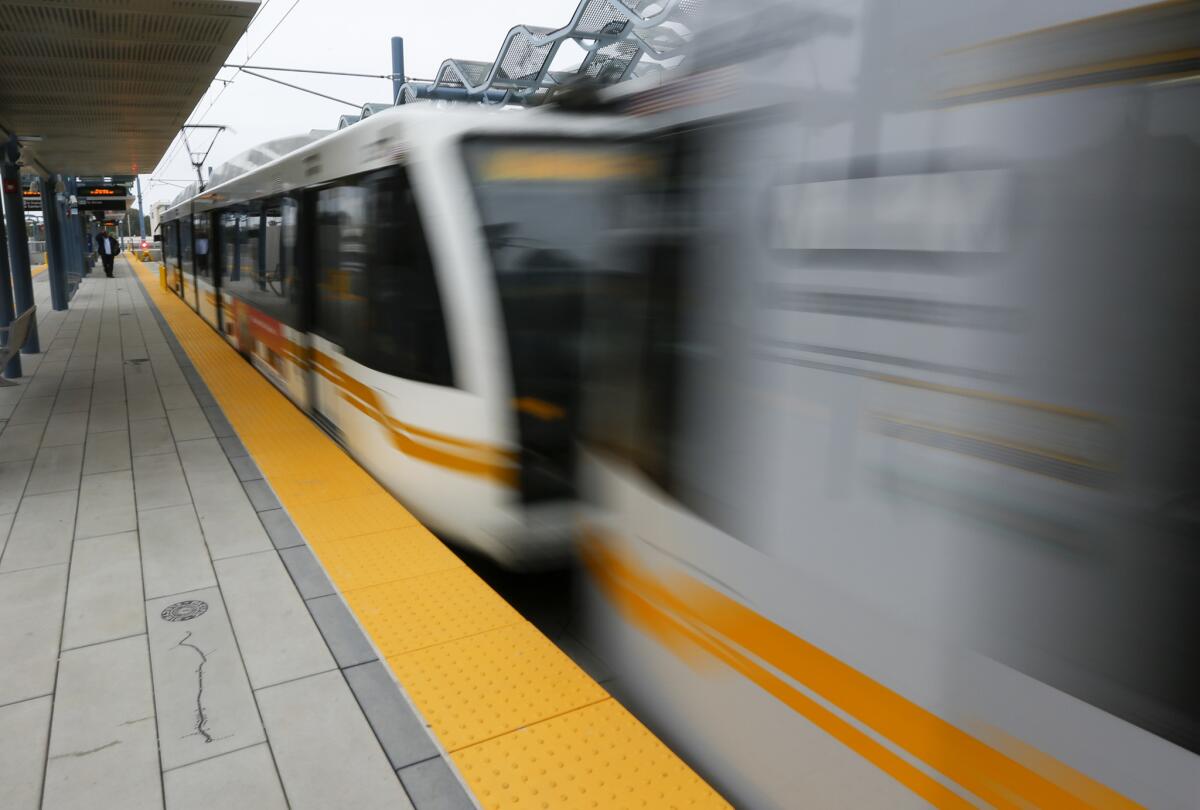Judge backs ballot language for Metro’s sales tax increase proposal

- Share via
A Metropolitan Transportation Authority proposal to raise Los Angeles County’s base sales tax rate to fund transit and highway projects does not need to be rewritten before appearing on the November ballot, a judge said Tuesday.
Superior Court Judge Mary H. Strobel ruled against a coalition of seven cities that sued last month over the ballot language for Metro’s sales tax proposal, saying there was no evidence that the brief description would be confusing to voters.
The seven suing cities, including Carson and Torrance, had argued that a 75-word blurb slated to appear on the ballot violated California election law because it did not specify how much revenue the tax would generate per year, or how long the tax would last.
In a 10-page ruling, Strobel said Metro’s sales tax proposal, vetted in public hearings and meetings, is not subject to the same requirements as measures placed on the ballot through a signature-gathering process.
Carson mayor Albert Robles called the ruling “disappointing,” and said Metro circumvented “truth, honesty and fairness” in its description of the tax.
“Hiding behind hyper-technical distinctions is disingenuous,” Robles said. He would not say whether he would campaign against the measure.
A spokeswoman for Carson, Norwalk, Torrance, Santa Fe Springs, Signal Hill, Rancho Palos Verdes, and Commerce said the suing cities had not decided whether to appeal the ruling.
A Metro spokesman said the agency was “appreciative” of the judge’s ruling. Yusef Robb of the Yes on Measure M campaign said in a statement that “the plaintiffs should stop interfering with the voters’ right to make their own judgment.”
Measure M would raise an estimated $860 million per year to expand Los Angeles County’s transit network, including a rail tunnel through the Sepulveda Pass and a light-rail line between Union Station and Artesia.
If Metro’s tax proposal receives a two-thirds’ majority vote, the county’s base sales rate would increase by 0.5%, to 9.5%. The rate would be higher in some cities that have imposed local sales taxes.
The tax rate would double to 1% in 2039 to replace the revenue lost when Measure R, another half-cent sales tax, expires. The tax would then continue indefinitely.
The lawsuit reflects some simmering displeasure with Measure M in the corners of Los Angeles County.
Officials with the South Bay Council of Governments, which represents 16 cities, have refused to endorse Measure M, saying their cities would generate more tax revenue than they would get back through transit investment and funds for local road repairs.
The Gateway Cities Council of Governments voted 21-1 to oppose the measure, saying projects in the region that were partially funded through a previous tax measure have been “leapfrogged” by new proposals.
“We all want every project to start tomorrow,” Garcetti said at a news conference last week. He said residents of the South Bay and the Gateway Cities want the investments that Measure R would bring, and that officials there should “let the voters decide.”
The suing cities argued that Metro’s headline for Measure M — “Los Angeles County Traffic Improvement Plan” — was misleading because it implied that spending from the measure would be allocated equally across the county.
“Given the substantial amount of work proposed by the ordinance, as well as the size of the county, a reasonable voter would not interpret the reference to ‘Los Angeles County’ to mean an exacting and equal distribution of tax dollars or projects,” Strobel wrote.
She added: “Whether or not Measure M is good or fair policy is not at issue here.”
Twitter: @laura_nelson
ALSO
Two possible cases of leprosy reported at Riverside County elementary school
L.A. County supervisors support city bond measure for homeless housing construction
L.A. to pay $750,000 to fired city official who had been labeled a ‘workplace bully’
More to Read
Sign up for Essential California
The most important California stories and recommendations in your inbox every morning.
You may occasionally receive promotional content from the Los Angeles Times.














